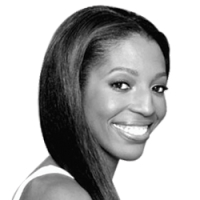While horrifying, Jeremy Clarkson’s grotesque description of his hatred of Meghan Markle—and the actual abuse that he’d like to see her physically subjected to—has actually served a surprising purpose.
Thanks to him, every person who dismissed Markle and her husband’s claims of the hostility they faced in England—and particularly within certain circles—now knows they weren’t exaggerating.
After all, if this is what Clarkson felt comfortable saying out loud, goodness only knows what’s being uttered behind closed doors. (It’s worth noting he recently attended a luncheon that included Prince Harry’s stepmother, Camilla. If only those walls could talk.)
But Clarkson’s rage has also affirmed what has proven to be the most significant and uncomfortable revelation to emerge from the Harry & Meghan Netflix docu-series. Despite the long-held myth that social mobility allows minorities to bypass the most painful realities that come with racial inequity, the tradeoffs you must make to survive in rarefied circles are filled with another kind of pain, as well as fear and, most of all, isolation.
Let me put it more bluntly. Meghan Markle is married to one of the most privileged and connected white men in the world. Yet even though he has said she was a victim of discrimination in an institution in which he had decades of seniority and credibility, people have not only called them both liars, but they’re angry with her. (“Make it make sense,” as the kids say.)
Consider this: Most Black women working in rarified environments don’t have a Prince Harry to defend them. So that means if you are a Black woman and you “make it” in banking, big law, tech, or the highest levels of media or entertainment (particularly behind the scenes as an executive or agent where real power lies), you are often going to be the only one in a room, in a department, on a set, or at a dinner party. That means that whether you like it or not, in the eyes of many, your performance will reflect not just on you but any other person who looks like you that may be in the running for a similar role someday.

In other words, if a white male struggles as a CEO, or president, no one worries about whether or not another white guy will ever get the chance in a similar role. Yet every single Black person I’ve ever spoken to who is a trailblazer in any field talks about the fear of screwing up, and thus making it harder for the next one who comes behind you.
In fact, a Black woman I know actually said her frustration with Markle is simply that no matter how badly she was treated, she had a responsibility to channel pioneers who had it worse but endured, like Jackie Robinson.
In 1947, Robinson became the first Black player in Major League Baseball. He was famously told by the white executive responsible for his rise not to fight against the racial hostility he faced for his first two seasons. No matter how painful. No matter how psychologically taxing. He simply had to endure.
So, from the aforementioned woman’s vantage point—Markle was supposed to hang in there so that the next princess of color would have an easier road. But why should one person have to shoulder such a burden?
Speaking from experience you don’t have to be Jackie Robinson or Meghan Markle-level famous for this “endure at any costs” mentality to take a toll. I remember having a host of health problems and my medical doctor finally asked if I was under significant stress. I said no, but then casually added that I was working on something in an environment where very few Black women had ever made it. My words to my doctor were, “I cannot fail. It will hurt those who come behind me. I’ve got to get to the finish line and I’ve got to get there with a smile.” My doctor simply looked at me and said, “You can’t live that way. It’s not healthy.”
She was right, of course, but two things can be true at once.
It’s not a healthy way for me or anyone else to live. It’s also a reality for many people of color who infiltrate halls of power. You end up with a toxic combination of bottled-up anxiety and occasional guilt. That’s because at work, you spend inordinate energy trying not to give anyone a reason to describe you as angry—even in moments you have a right to be—because you don’t want to give power to the ugliest stereotypes that exist about people who look like you, particularly if you are the only one there who looks like you.
But, at home you may feel equally cautious, because even complaining about legitimate indignities you may face, like unequal pay, in some of the world’s most exclusive domains can feel pretty silly, especially if you have a relative worried about paying the rent.
This has, in fact, been one of the other primary criticisms Markle has faced. If racism is George Floyd being killed by a police officer, then how can it also be something endured by someone who literally lives in a palace?
Again, two things can be true at once.
As I was going through a particularly stressful moment in my career, my mother gave me one of the greatest gifts of my life. I was venting to her, then caught myself mid-sentence and said, “I can’t believe I’ve been going on about this when I know you and grandma actually picked cotton. I sit inside working on a laptop. I’m sorry.” Proving yet again that I hit the mom lottery, she laughed and then said, “Sweetheart, first of all we did that work so you could get the kinds of opportunities you have now. And the truth is, when I finished picking cotton at the end of a long day, I went home, rested, and didn’t think about it until the next day. Frankly, I get exhausted hearing what you and your friends go through and I know it weighs on you constantly, which is the most exhausting part of all.” It was one of the most graceful and insightful things she has ever said to me.
In other words, what some may dismiss as champagne problems are still problems dressed up, and can still take an unimaginable toll. Thankfully, we are actually living in an era in which someone like Markle can find a platform in which sharing those problems can help others struggling similarly, and can also help those in power learn how to better support the Black women they have elevated, so they will choose to stay.
So what’s the best way to do that? All companies, corporations, and institutions should take a cue from the most powerful house in America, or more specifically the women in it. Despite being a minority trailblazer himself, President Barack Obama’s senior aides were overwhelmingly male, and high-ranking women realized they were struggling to be included in meetings and to get proper credit for their ideas.
So they took action.
They utilized a system called “amplification,” where they made sure there were at least two of them in key exchanges, to help back one another up professionally.
This strategy is credited with transforming and increasing the influence of women in the Obama White House. But, of course, for amplification to work, there has to be more than one carrying the burden.
So instead of asking the question, “Why couldn’t Meghan Markle endure?”—the more pertinent question is “Why was Meghan Markle forced to try to succeed in an environment where, despite existing for hundreds of years, she was still the only one that looked like her?”









